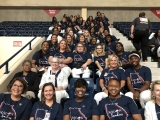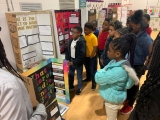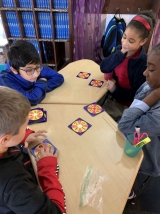-
Category 2
Selected in 2019
-
Grades: pre k - 5
School Setting: urban
Town Population: 155
Student Enrollment: 468
Student Demographics:
Black/African American: 63%
Teacher/Student Ratio: 1:13.3
White/Caucasian: 22%
Hispanic: 2%
Hawaiian/Pacific Islander: 6%
Asian: 6%
Native American: 0%
Other: 1%
% Reduced Lunch: 99.1%
% ELL Learners: 6%
Founded: 1993 -
PRINCIPAL:
Latricia Reeves -
CONTACT:
5910 Zebulon Road
Macon, GA 31210
478-779-3350
latricia.reeves@bcsdk12.net
Sonny Carter Elementary School
Macon, GA
We have an intrinsic belief that 'all children can learn.'
- Describe specific programs in place to ensure that families are involved in the success of your school and students.
- Carter Elementary hosts a variety of events to build the capacity for strong partnerships between the school, parents, and the community to improve student achievement. All meetings for parents and families are held at convenient times in the morning and in the evenings. Some of the events we host throughout the school year include Open House/New Family Orientation, an Annual Title I Meeting, Technology and Digital Literacy Talk, Data Date Night, Promotion Criteria Meetings, Transition Meetings, Leadership Day, Fun Run, Field Day, Read for the Record Day, and National Parental Involvement Day. One of our most successful events is Data Date Night. Parents have an opportunity to learn ways the school monitors their child's progress: College and Career Ready Performance Index, GKIDS, and GA Milestones. Parents enjoy student performances, and experience their child's math class using interactive hands-on exemplars. Students share their leadership notebooks and set performance goals.
- Describe the most successful activity your school has initiated to strengthen ties to your community.
- Carter was one of two elementary schools in Bibb County to pilot the Leader in Me. Bibb's Business Education Partnership raised money to support this process. The LIM framework is an evidenced-based, comprehensive-school improvement model that empowers students with the leadership and life skills they need to thrive in the 21st century. Teachers, students, and parents were taught Covey's 7 Habits of Highly Effective People. As a result, Carter created a school culture based on a shared set of beliefs that everyone can be a leader and exercise behavior expectations that foster academic success, safety, and social emotional development. Each year Carter holds a Leadership Event. Leadership Day is a special opportunity for our school to open our doors to the community to show off the great things that are happening. Students help plan this event, give guided tours, share leadership notebooks, perform musical selections, give speeches, share service projects, and much more!
- Describe your philosophy of school change or improvement.
- We believe that education is the vehicle which transports children safely through their meandering journey of intellectual, social, emotional and physical development. It is driven by individuals who are deeply committed to following the road map that leads to their intrinsic belief that "all children can learn." Carter Elementary equips all students to learn and lead at their highest level. All means all!
- What are your school’s top two goals for the next year?
- Our top two goals for next year are to continue increase the number of students reading on grade level and to increase the community involvement in our school. We want to achieve academic excellence for all students as we continue to engage our community stakeholders in a shared responsibility of educating each student for a 21st century global society.
- What is the single most important factor in the success of your school that others could replicate?
- The single most important factor in the success of our school has been to focus on building Collective Teacher Efficacy. We understand the importance of empowering our teachers to take on leadership roles. Carter's administration is intentional about creating meetings and opportunities for our staff to express their opinions. We carefully structure our meetings and action teams in a way that encourages professional dialogue rather than allowing a few voices to dominate. When teachers have a role in making important school decisions, feel their voices are heard, and can actively participate in building school culture, efficacy is raised. When teachers and leadership work together toward mutual goals, so grows a shared belief in the direction of the work and ability to effect change with students (Hattie, 2012).
- Describe the program or initiative that has had the greatest positive effect on student achievement, including closing achievement or opportunity gaps, if applicable.
- Implementing the Plan-Do-Check-Act/Adjust model with fidelity during math instruction had the greatest positive effect on student achievement. Through the BCSD’s master schedule, intervention time was automatically built in the instructional day with students receiving two additional 45-minute blocks of weekly math interventions. During this intervention block, a strong focus was placed on the four components of the instructional cycle. Lastly, throughout the process, students were routinely required to track their own data in their individual data notebooks, developing ownership of personal progress and growth. Not only were students’ achievements recognized through quarterly award celebrations, students were also recognized and encouraged daily based on their documented growth. Celebrations of learning were held each time a growth goal was met.
- Explain how ESEA federal funds are used to support your improvement efforts.
- Title I funds are used to improve teaching and learning for students. Based on a needs assessment and trend data, Carter allocates nearly 90% of its Title I budget to hiring additional staff. We hired an academic coach, a reading interventionist teacher in grade 3, an instructional paraprofessional, tutors, and a Family Engagement Facilitator. We also pay for two additional collaborative planning days for teachers to meet in their grade level teams and content specific vertical teams to analyze data and develop instructional plans.
- Identify the critical professional development activities you use to improve teaching and student learning.
- Carter's Academic Coach plays a significant role in teacher development and teacher retention. She meets with teachers during collaborative planning on a weekly basis. This coach supports teachers in professional learning communities, monitors and observes instructional practices, models best practices, provides actionable feedback, gathers materials/resources for classroom instruction, schedules peer/teacher observations, and provides support to new teachers. Carter's academic coach receives extensive training through our school district's Teaching and Learning Department in order to strengthen pedagogy and coaching skills. Particularly, our coach is trained to utilize Get Better Faster - Uncommon Schools, the Center for Educational Leadership - 5 Dimensions of Teaching and Learning Instructional Framework, Max Scholar Phonics Instruction, The Core Six Essential Strategies for Achieving Excellence, Number Talks, and a variety of research based protocols.
- Describe how data is used to improve student achievement and inform decision making.
- Utilizing flexible grouping during daily instructional time in order to effectively focus on the individual needs of students and the collective needs of student groups had the greatest positive effect on student achievement. Formative assessments, such as STAR Reading, STAR Math, Write Score, and School City (Bibb County School District (BCSD) learning initiative assessments), were periodically administered. Based on the use of a data protocol and review of the data, students were regrouped. Within the instructional setting, daily formative assessments requiring reading comprehension/writing and the implementation of problem-solving strategies in math were given to students. Students took assessments on a bi-weekly basis in order to familiarize them with online testing. The assessments were designed to reflect the Georgia Milestones format. Carter's administration closely monitors instructional practices and analyzes a variety of assessment data to help drive decision making.
- Describe your school culture and explain changes you’ve taken to improve it.
- Carter's school culture consists of educators who embrace high levels of learning. Our mission is to equip all students to learn and lead at their highest level and ensure all children are surrounded by adults who support them in achieving their fullest potential. We understand the importance of Professional Learning Communities at Work (Dufour, DuFour, Eaker, Many, and Mattos, Learning by Doing, 2016). Carter's administration created a guiding coalition to to help lead this work and build capacity. Our teachers focus on student learning, work collaboratively, and take collective responsibility for the success of each student. Administration values and protects common collaborative planning time for teachers. We believe "[High-achieving schools] build a highly collaborative school environment where working together to solve problems and to learn from each other become cultural norms" (WestEd, 2000, p.12). With this laser focus on student learning, we have created a growth mindset.
Stats
-
Category 2
Selected in 2019
-
Grades: pre k - 5
School Setting: urban
Town Population: 155
Student Enrollment: 468
Student Demographics:
Black/African American: 63%
Teacher/Student Ratio: 1:13.3
White/Caucasian: 22%
Hispanic: 2%
Hawaiian/Pacific Islander: 6%
Asian: 6%
Native American: 0%
Other: 1%
% Reduced Lunch: 99.1%
% ELL Learners: 6%
Founded: 1993 -
PRINCIPAL:
Latricia Reeves -
CONTACT:
5910 Zebulon Road
Macon, GA 31210
478-779-3350
latricia.reeves@bcsdk12.net










